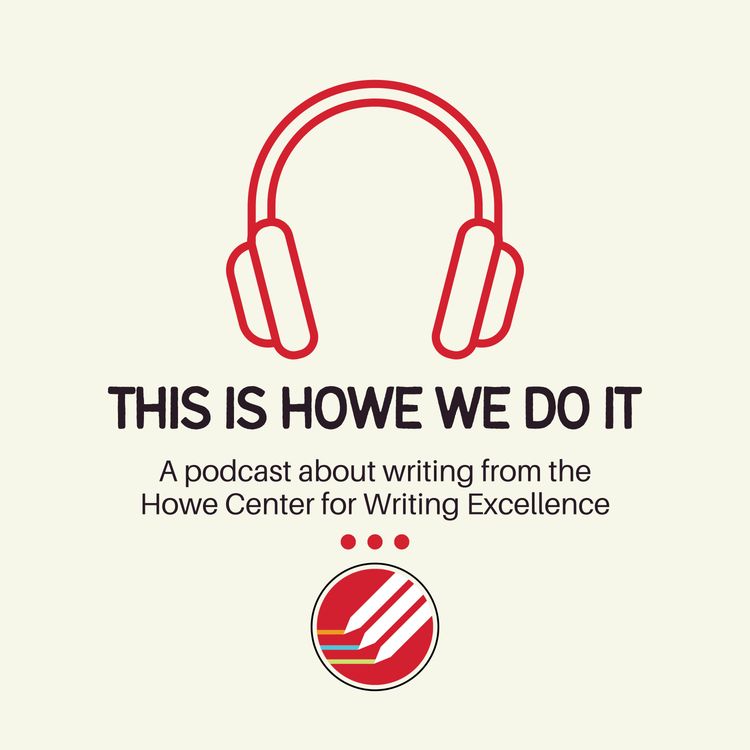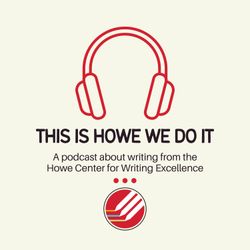Share

This Is Howe We Do It
Ideate, Research, and Create: Processes for AI Partnerships with Dennis Cheatham
In this episode, Dennis Cheatham and I discuss various ways for partnering with generative AI as a thinking partner for writing and designing through a process-centered framework. Drawing from a course he specifically designed around creating with AI, this conversation offers insight into the use of AI tools in teaching design and writing in ways that focus on and assess the process as the means for learning. We emphasize the need for human writers and designers in this process while also highlighting the capabilities and consequences of using AI tools.
Resources Related to this Episode
- Dennis's Design Workbench Website
- AI Design Workbench Website
- Integrating AI to Guide Learning (HCWE Teaching Resource)
- AI Text Generators and Teaching Writing Starting Points for Inquiry
- AI Text Generators: Sources to Stimulate Discussion Among Teachers (compiled by Anna Mills)
Check out additional resources at our website: https://miamioh.edu/HCWE or write to us at hwac@miamioh.edu if you have questions or ideas for topics you’d like to hear about in future podcasts.
More episodes
View all episodes

17. From Student Writers to Published Scholars with Kendyl Gurren and Alyssa Rose
34:56||Season 1, Ep. 17In this episode, we sit down with undergraduate writing consultants and emerging scholars Kendyl Gurren and Alyssa Rose to explore their journeys as writers, researchers, and collaborators. Drawing on their work in the Howe Writing Center, Kendyl and Alyssa reflect on how consulting has reshaped the way they understand writing, teaching, and learning across contexts. They take listeners behind the scenes of their writing and publication processes—from generating research questions and developing arguments to grappling with feedback, revision, and academic voice. Along the way, they highlight the power of collaboration, reflection, and undergraduate research as pathways into scholarly communities, offering insight and encouragement for students navigating their own writing lives. Check out their published works linked below!Resources Related to or Mentioned in this Episode/Plugged by Our Guests"Becoming Known" - Kendyl Gurren (Queen City Writers)"Empowering Authentic, Agentic Adolescent Voices in ELA Practice Through Critical Approaches with Young Adult Literature" - Kelli A. Rushek, Delaney Barrett, Christopher Carter, Lada Gallant, Alyssa Rose, Grace Williams, and Katherine E. Batchelor (Ohio Journal of English Language Arts)Howe Writing CenterCheck out additional resources at our website: https://miamioh.edu/HCWE or write to us at hwac@miamioh.edu if you have questions or ideas for topics you’d like to hear about in future podcasts.If you'd like to interact with us about this episode, comment to us through our Spotify or through our Instagram @thisishowewedoitpod.
16. Consulting with Writers in the Howe Center for Business Writing with Katie Barton and Kelsie Weingart
32:52||Season 1, Ep. 16In this episode, we talk with undergraduate writing consultants Katie Barton and Kelsie Weingart about their experiences supporting writers in the Howe Center for Business Writing (HCBW). They share what it’s like to work with business students on everything from presentations to team writing—especially through fast-paced, focused appointments—and how consulting in the HCBW’s recently revamped space shapes their approach and offerings for business and professional writers. They also reflect on how consulting has strengthened their own professional communication, offering insight into the skills they’ll carry forward into their diverse career paths.Resources Related to or Mentioned in this Episode/Plugged by Our GuestsHowe Center for Business WritingHCBW Resources for Business Writing and PresentingCheck out additional resources at our website: https://miamioh.edu/HCWE or write to us at hwac@miamioh.edu if you have questions or ideas for topics you’d like to hear about in future podcasts.If you'd like to interact with us about this episode, comment to us through our Spotify or through our Instagram @thisishowewedoitpod.
15. The Value of Degree Programs in Professional Writing with Kerigan Moore and Cassell Presnell
42:10||Season 1, Ep. 15What can a degree or minor in Professional Writing, Rhetoric and Composition, or Writing Studies offer students today—and why should institutions invest in programs like it? In this episode, Miami undergraduate students and Howe Writing Center consultants Kerigan Moore and Cassell Presnell share how they found their way to studying writing, what they’ve gained from their courses and writing center work, and how these experiences have prepared them for life beyond college—in their case, pursuing law school! Together, we explore what makes degrees in writing invaluable for students and for the institutions that support them.Resources Related to or Mentioned in this Episode/Plugged by Our GuestsHowe Writing CenterWhy Professional Writing at Miami? Professional Writing Major, BA at Miami UniversityCheck out additional resources at our website: https://miamioh.edu/HCWE or write to us at hwac@miamioh.edu if you have questions or ideas for topics you’d like to hear about in future podcasts.If you'd like to interact with us about this episode, comment to us through our Spotify or through our Instagram @thisishowewedoitpod.
14. Mentoring Writing Center Consultants with Lizzie Hutton and Cam Cavaliere
46:45||Season 1, Ep. 14In this episode, we sit down with Howe Writing Center Director Dr. Lizzie Hutton and Graduate Assistant Director Cam Cavaliere to talk about the processes for introducing consultants to writing center work and mentoring the undergraduate and graduate writing consultants who work at the HWC. More specifically, we discuss how students’ experiences consulting with their peers in the writing center and engaging in writing center research and programming supports them as writers, consultants, and researchers, preparing them with a variety of professional skills.Resources Related to or Mentioned in this Episode/Plugged by Our GuestsHowe Writing CenterInformation for Applying to Be a Howe Writing Center ConsultantCheck out additional resources at our website: https://miamioh.edu/HCWE or write to us at hwac@miamioh.edu if you have questions or ideas for topics you’d like to hear about in future podcasts.If you'd like to interact with us about this episode, comment to us through our Spotify or through our Instagram @thisishowewedoitpod.
13. Peer Review in Practice: Insights from Student Writing Center Consultants with Katie Dykhuizen & Charlotte Melville
41:15||Season 1, Ep. 13In this episode, we sit down with two Howe Writing Center undergraduate writing center consultants Katie Dykhuizen & Charlotte Melville, to get their student perspectives on peer review processes and giving feedback to other students. They share their experiences engaging in peer review cross classroom and consultation settings and reflect on what makes feedback processes and interactions effective, how different formats shape this process, and what they’ve learned from working with peers on their writing. Which strategies have worked best for you when engaging in this kind of peer feedback?Resources Related to or Mentioned in this Episode"Engaging Students in Effective Peer Response" - Howe Writing Across the Curriculum Teaching ResourceLiz Lerman's Critical Response ProcessResources Plugged by Our Guests"Being Told and Not Told: Epistemology as a Literary Device and Theme in Never Let Me Go" by Charlotte Melville, published in The Rock Creek ReviewKatie Dykhuizen's STEM research Google SiteCheck out additional resources at our website: https://miamioh.edu/HCWE or write to us at hwac@miamioh.edu if you have questions or ideas for topics you’d like to hear about in future podcasts.If you'd like to interact with us about this episode, comment to us through our Spotify or through our Instagram @thisishowewedoitpod.
12. Principles for Peer Review and Perspectives on EdTech with Kelli Rushek and Will Chesher
54:43||Season 1, Ep. 12In this episode, we chat with Dr. Will Chesher (Howe facilitator) and Dr. Kelli Rushek about their work in a cross-disciplinary Faculty Learning Community exploring peer review—also known as peer response, peer feedback, or reader response. They share insights from their research into the practice of peer review and reflect on their experiences testing out two different edtech platforms designed to support it. Tune in for practical takeaways on how to make peer feedback more meaningful in the classroom (and for an outstanding Montel Jordan impression from Kelli)!Resources Related to this EpisodeEli Review - Peer review platform developed by writing studies scholars Jeff Grabill, Bill Hart-Davidson, and Mike McLeod"Engaging Students in Effective Peer Response" - Howe Writing Across the Curriculum Teaching ResourceWhat is an FLC?: Miami University Center for Teaching Excellence "Faculty Learning Communities (FLC)"Article about this project: "Howe Center for Writing Excellence and Center for Teaching Excellence Earn Technology Grant Award to Pilot Peer Review Platforms in Spring 2023"Check out additional resources at our website: https://miamioh.edu/HCWE or write to us at hwac@miamioh.edu if you have questions or ideas for topics you’d like to hear about in future podcasts.
11. Generative AI's Toll on People, Places, and Our Planet with Dustin Edwards
50:40||Season 1, Ep. 11In this episode, we are joined by Dustin Edwards to unpack digital damage, his framework for understanding the extractive nature of large-scale digital infrastructures drawn from his forthcoming book, Enduring Digital Damage: Rhetorical Reckonings for Planetary Survival. His insights into the environmental and ethical costs of using AI tools and the implications of digital infrastructure on people and places prompts us to question and consider the impacts of choices for/when using (or not using) generative AI tools.Resources Related to this EpisodePre-order Dustin's book ahead of its expected November 2025 release here: Enduring Digital Damage: Rhetorical Reckonings for Planetary Survival,Dustin Edward's previous work in this area: Edwards, Dustin. “Digital Rhetoric on a Damaged Planet: Storying Digital Damage as Inventive Response to the Anthropocene.” Rhetoric Review, vol. 39, no. 1, 2020, 59–72. Honorable Mention for the 2020 Theresa J. Enos Anniversary Award. Check out additional resources at our website: https://miamioh.edu/HCWE or write to us at hwac@miamioh.edu if you have questions or ideas for topics you’d like to hear about in future podcasts.
10. The Role of Writing Center Consultants in the Age of AI: Students' Perspectives and Consultants’ Research on AI Writing Tools with Ally Britton-Heitz, Kylie Mullis, and Meredith Perkins
40:08||Season 1, Ep. 10In this episode, we hear the perspectives of three undergraduate writing center consultants, Meredith Perkins, Kylie Mullis, and Ally Britton-Heitz about their research on AI-generated feedback on writing and how it compares to the written feedback given by writing center consultants. We discuss what they have learned about using AI tools, the strengths and weaknesses of the feedback it generates, and the implications for these tools on writing centers and writers' practices for engaging with feedback.Resources Related to this EpisodeGraphic with Research Findings on AI-Generated vs. Consultant-Generated FeedbackAlly Britton-Heitz & Jeffrey Merhout's 2024 article: "Human Roles in Implementation and Oversight of Artificial Intelligence: Towards a Governance Framework"Perkins, Meredith, Ally Britton-Heitz's, and Kylie Mullis. (2025) "How the Lack of Cohesion in University AI Policy Poses Challenges to Writing Consultants." Praxis: A Writing Center Journal 22(1). Check out additional resources at our website: https://miamioh.edu/HCWE or write to us at hwac@miamioh.edu if you have questions or ideas for topics you’d like to hear about in future podcasts.